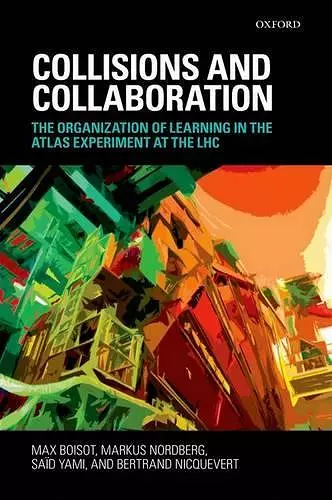Collisions and Collaboration
The Organization of Learning in the ATLAS Experiment at the LHC
Markus Nordberg author Max Boisot author Saïd Yami author Bertrand Nicquevert author
Format:Hardback
Publisher:Oxford University Press
Published:28th Jul '11
Currently unavailable, and unfortunately no date known when it will be back

After twenty-five years of preparation, the Large Hadron Collider at CERN, Geneva, is finally running its intensive scientific experiments into high-energy particle physics. These experiments, which have so captured the public's imagination, take the world of physics to a new energy level, the terascale, at which elementary particles are accelerated to one millionth of a percent of the speed of light and made to smash into each other with a combined energy of around fourteen trillion electron-volts. What new world opens up at the terascale? No one really knows, but the confident expectation is that radically new phenomena will come into view. The kind of 'big science' being pursued at CERN, however, is becoming ever more uncertain and costly. Do the anticipated benefits justify the efforts and the costs? This book aims to give a broad organizational and strategic understanding of the nature of 'big science' by analyzing one of the major experiments that uses the Large Hadron Collider, the ATLAS Collaboration. It examines such issues as: the flow of 'interlaced' knowledge between specialist teams; the intra- and inter-organizational dynamics of 'big science'; the new knowledge capital being created for the workings of the experiment by individual researchers, suppliers, and e-science and ICTs; the leadership implications of a collaboration of nearly three thousand members; and the benefits for the wider societal setting. This book aims to examine how, in the face of high levels of uncertainty and risk, ambitious scientific aims can be achieved by complex organizational networks characterized by cultural diversity, informality, and trust - and where 'big science' can head next.
This is a masterful piece of research that will make an enduring contribution to our knowledge of how the organization of science develops at the frontier of knowledge. Boisot and his many colleagues have crafted an excellent volume that convincingly explains why management theorists may have more to learn about scientific organization from physicists than vice versa. Henry Chesbrough, Professor at the Haas School of Business, University of California, Berkeley, and author of Open Innovation: The New Imperative for Creating and Profiting from Technology This book has vast implications far beyond CERN, The Large Hadron Collider, and the Atlas project. Based on the concept of "Information Space", 3000 scientists and others face the irreducible unknown. Standard planning and optimization fail. Emergence and generativity succeed. This book is a prolegomenon for governments and an emergent set of interwoven global civilizations. Stuart Kauffman, MacArthur Fellow FRSC, Santa Fe Institute, University of Vermont, and author of At Home in the Universe, Investigations, and others
ISBN: 9780199567928
Dimensions: 236mm x 153mm x 24mm
Weight: 695g
336 pages